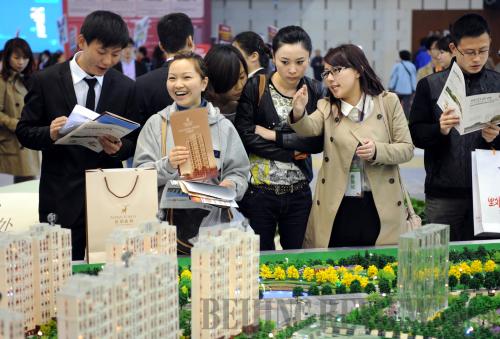What next for property market?
Updated: 2013-05-24 09:40
(bjreview.com)
|
||||||||
|
 |
|
A real estate company representative introduces housing projects to buyers at a property fair in Nanjing, Jiangsu Province, on April 19.[Photo/Xinhua] |
He Yuanxiang is a Beijing-based real estate agent working at Homelink, one of the biggest house brokerages in the country. She expected a lesser workload after an extremely busy March, but that's not what she got.
In March, the central government rolled out measures designed to cool China's red-hot property market by reining in speculative investment. One of the measures, a 20-percent tax on capital gains from property sales, a pilot project in some cities, triggered widespread panic among potential buyers and sellers. Fearing higher home costs after the implementation of government control measures, potential buyers rushed to buy before the changes went into effect, creating a secondhand property-purchasing spree in March in many cities.
"After the March purchase spree, the market only cooled off for a short period and then started to heat up again," He told Beijing Review, noting that the Homelink branch she works for sealed six deals during the second weekend of May.
"If the apartment is exempt from paying the 20-percent tax, the price shoots up by hundreds of thousands of yuan by sellers. If not, secondhand-home buyers will have to pay the exorbitant tax," she said. "Anyway, home costs are higher than before. It turns out that the earlier you buy a home in Beijing, the better."
He's words were echoed by a Real Estate Blue Book published by the Institute for Urban and Environmental Studies at the Chinese Academy of Social Sciences (CASS) on April 25. The blue book projects that housing and land prices in China will see a continuous increase in 2013. In big cities like Beijing, Shanghai and Guangzhou, a sharp price surge is likely to occur in 2013, due to a growing imbalance between supply and demand. The Chinese Government will face greater pressure in terms of housing price controls and may consider expanding the capital gains tax to more regions.
Slow ascent
Latest figure showed that new home prices rose in almost all Chinese cities in March. Of a statistical pool of 70 major Chinese cities, 68 saw home price increases in March from a month earlier, up from 66 in February, according to the National Bureau of Statistics. On a year-on-year basis, 67 cities registered higher prices in March. The number in February was 62. First-tier cities recorded the largest monthly increase in new home prices, with Shanghai's 3.2-percent growth topping the list, followed by 2.8 percent in Shenzhen and 2.7 percent in Beijing. The average price of newly built apartments in 100 Chinese cities hit 10,098 yuan ($1,640) per square meter in April, rising 1 percent from the previous month. Prices have risen for 11 consecutive months since June, according to a report from the China Index Academy.
"Demand outstripping supply is the key reason for the price hike," said Li Enping, a research fellow with the CASS and also one of the authors of the blue book. "If the 20-percent profit-gain tax is strictly implemented, housing prices will rise faster because the tax suppresses supply. On the one hand, the new tax will add a burden to homebuyers. On the other, people who can no longer afford a secondhand-home will turn to newly built homes, pushing up prices of the latter," said Li.
China's young have rushed to the market to buy homes, as many consider owning an apartment a prerequisite for getting married. The average age of first-time homebuyers is 27 in Beijing, while it's 37 in Britain and 42 in Germany and Japan, according to the CASS blue book. Also, insufficient affordable housing projects and fast-rising rentals make Chinese people constantly insecure, pushing up the demand for buying a home.

 Michelle lays roses at site along Berlin Wall
Michelle lays roses at site along Berlin Wall
 Historic space lecture in Tiangong-1 commences
Historic space lecture in Tiangong-1 commences
 'Sopranos' Star James Gandolfini dead at 51
'Sopranos' Star James Gandolfini dead at 51
 UN: Number of refugees hits 18-year high
UN: Number of refugees hits 18-year high
 Slide: Jet exercises from aircraft carrier
Slide: Jet exercises from aircraft carrier
 Talks establish fishery hotline
Talks establish fishery hotline
 Foreign buyers eye Chinese drones
Foreign buyers eye Chinese drones
 UN chief hails China's peacekeepers
UN chief hails China's peacekeepers
Most Viewed
Editor's Picks

|

|

|

|

|

|
Today's Top News
Shenzhou X astronaut gives lecture today
US told to reassess duties on Chinese paper
Chinese seek greater share of satellite market
Russia rejects Obama's nuke cut proposal
US immigration bill sees Senate breakthrough
Brazilian cities revoke fare hikes
Moody's warns on China's local govt debt
Air quality in major cities drops in May
US Weekly

|

|







